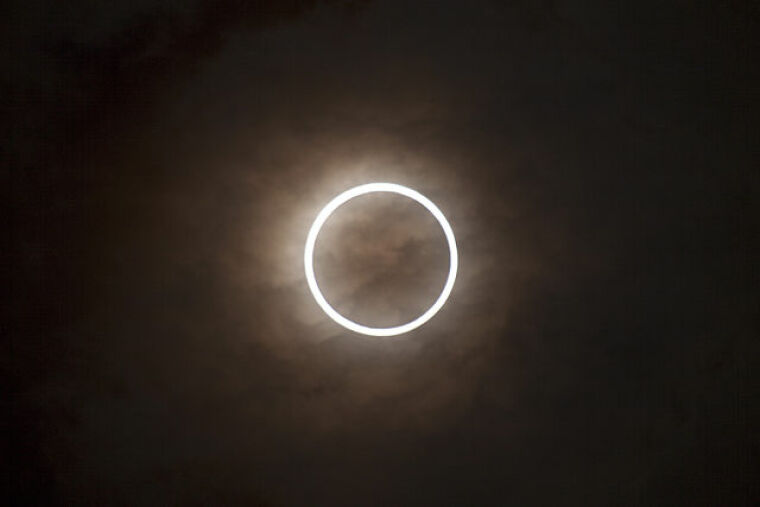Scientists say Biblical miracle in Book of Joshua may be oldest recorded solar eclipse

Researchers from Cambridge University have suggested that the miracle described in the Book of Joshua when "the sun stood still, and the moon stopped until the nation took vengeance on its enemies" may have been the earliest recorded solar eclipse.
In a study published earlier this month, the researchers claimed that the said eclipse occurred 3,224 years ago on Oct. 30, 1207 B.C.
The paper, titled "Solar eclipse of 1207 BCE helps to date pharaohs," suggested that the event was not a miracle at all, but an annular eclipse, a type of eclipse when the moon does not completely cover the sun, leading to the characteristic "ring of fire" appearance.
An eclipse has been recorded in China around 4,150 years ago, but the researchers dismissed earlier Chinese and Ugaritic records of eclipses as unreliable and concluded that the Bible contains the only record of a solar eclipse prior to 1000 B.C.
The authors of the study, Colin Humphreys and Graeme Waddington, noted that they were also able to use the eclipse to determine the precise dates of the reign of Rameses II, also known as Rameses the Great.
"If accepted, this appears to be the oldest solar eclipse recorded. When combined with Egyptian records, this eclipse enables us to hone the most accurate dates available for the reign of the famous Egyptian pharaoh Ramesses the Great to between 1276– 1210 BCE," the researchers wrote, according to The Jerusalem Post.
The currently accepted dates for the reign of Ramesses II are 1279–1213 B.C., with his son Merneptah reigning from 1213–1203 B.C.
To determine the date for the reign of the Egyptian pharaoh, the researchers consulted the Merneptah Stele, a granite tablet carved during the fifth year of the reign of Merneptah.
The tablet mainly describes Merneptah's victory over the Libyans, but it also contains several lines describing a campaign in Canaan, making mention of what many scholars translate as "Israel."
Previous scholars have reportedly tried to tie the Biblical account of the sun standing still to an eclipse, but they could not find any eclipses in the timeframe.
However, the previous studies only looked into total solar eclipses, in which the moon completely covers the sun.
The Cambridge researchers looked into annular solar eclipse and found a match on Oct. 30, 1207 B.C. when the path of an eclipse swept through the northeast of what is now Canada, the southwest coast of Portugal and Spain, a swathe through North Africa, and back up into the Near East.
The researchers noted if the interpretation of the Biblical account is correct, the text describes the event as having seen by Israelites in Gibeon, a Canaanite city identified with the modern day Palestinian village of Al Jib, located 10 kilometers (6.2 miles) northwest of Jerusalem.
"From our calculations, we find that the only annular eclipse visible from Gibeon between 1500 and 1050 BCE (using the same generous limits to the possible dates of entry of Joshua into Canaan) was on October 30,1207 BCE, in the afternoon. This eclipse passed directly over the land of Canaan," they concluded.
 Christians don't have to affirm transgenderism, but they can’t express that view at work: tribunal
Christians don't have to affirm transgenderism, but they can’t express that view at work: tribunal Archaeology discovery: Medieval Christian prayer beads found on Holy Island
Archaeology discovery: Medieval Christian prayer beads found on Holy Island Presbyterian Church in America votes to leave National Association of Evangelicals
Presbyterian Church in America votes to leave National Association of Evangelicals Over 50 killed in 'vile and satanic' attack at Nigerian church on Pentecost Sunday
Over 50 killed in 'vile and satanic' attack at Nigerian church on Pentecost Sunday Ukrainian Orthodox Church severs ties with Moscow over Patriarch Kirill's support for Putin's war
Ukrainian Orthodox Church severs ties with Moscow over Patriarch Kirill's support for Putin's war Islamic State kills 20 Nigerian Christians as revenge for US airstrike
Islamic State kills 20 Nigerian Christians as revenge for US airstrike Man who served 33 years in prison for murder leads inmates to Christ
Man who served 33 years in prison for murder leads inmates to Christ


 Nigerian student beaten to death, body burned over ‘blasphemous’ WhatsApp message
Nigerian student beaten to death, body burned over ‘blasphemous’ WhatsApp message 'A new low': World reacts after Hong Kong arrests 90-year-old Cardinal Joseph Zen
'A new low': World reacts after Hong Kong arrests 90-year-old Cardinal Joseph Zen Iran sentences Christian man to 10 years in prison for hosting house church worship gathering
Iran sentences Christian man to 10 years in prison for hosting house church worship gathering French Guyana: Pastor shot dead, church set on fire after meeting delegation of Evangelicals
French Guyana: Pastor shot dead, church set on fire after meeting delegation of Evangelicals ‘Talking Jesus’ report finds only 6% of UK adults identify as practicing Christians
‘Talking Jesus’ report finds only 6% of UK adults identify as practicing Christians Mission Eurasia ministry center blown up in Ukraine, hundreds of Bibles destroyed: 'God will provide'
Mission Eurasia ministry center blown up in Ukraine, hundreds of Bibles destroyed: 'God will provide' Church holds service for first time after ISIS desecrated it 8 years ago
Church holds service for first time after ISIS desecrated it 8 years ago Burger King apologizes for 'offensive campaign' using Jesus' words at the Last Supper
Burger King apologizes for 'offensive campaign' using Jesus' words at the Last Supper Uganda: Muslims abduct teacher, burn him inside mosque for praying in Christ’s name
Uganda: Muslims abduct teacher, burn him inside mosque for praying in Christ’s name